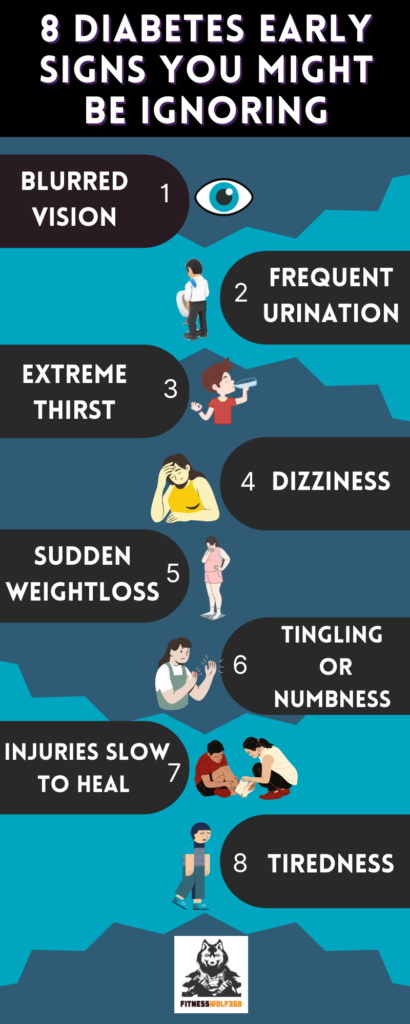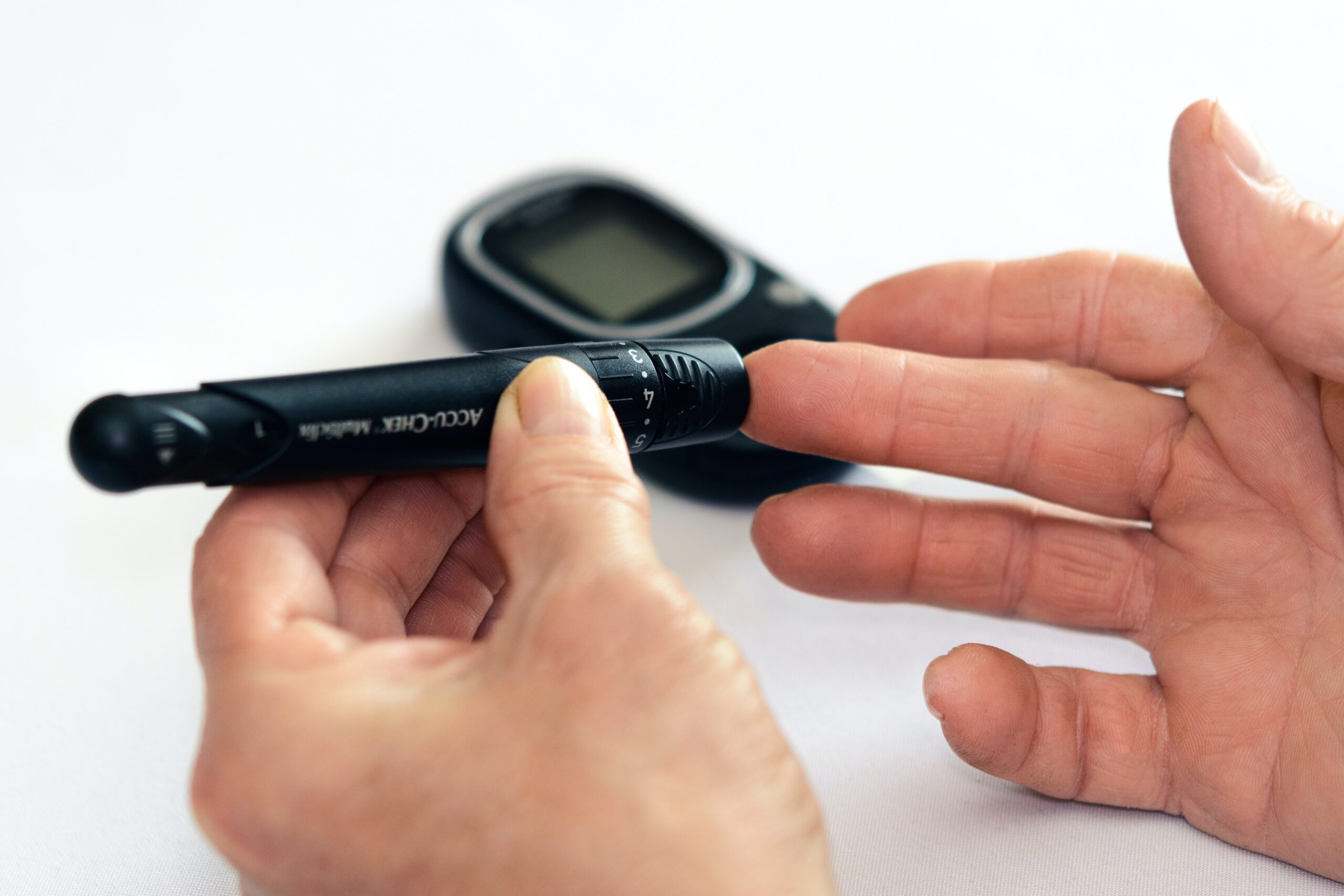8 Diabetes Early Signs to look out for
September 21, 2022Diabetes is a serious health condition when a person’s body stops utilizing sugar effectively which can lead to serious health complications over time, including heart disease, blindness, and even limb amputation.
There are generally two common types of diabetes.
Type 1-Diabetes: Where body’s auto-immune response takes down the insulin-producing cell hence which makes the body unable to produce insulin and is a genetic condition that often occurs early at a young age.
Type 2-Diabetes: In this type, the body becomes resistant to insulin and cannot utilize the sugar as energy, thus blood sugar level spikes as the body failed to put glucose inside the cell which in turn elevates the blood glucose levels.
It’s important to catch the disease early on so you can start managing blood sugar levels effectively and reduce the risk of damage it can cause to your body.
Although some of the symptoms of these 2 types of diabetes are different like breath smelling like a fruit or sweet which is related to diabetes type 1.
But most of the symptoms are very similar.
Here are the 8 Diabetes Early Signs you should be looking out for.

1) Blurred vision
Blurred vision is one of the most common symptom diabetes patients can suffer from.
The rapid fluctuations of sugar levels can cause blurred vision in the diabetic patient which returns to normal once the sugar levels settle.
People with diabetes often have blood vessels that have become damaged due to high levels of glucose in their bloodstream and these vessels get damaged over time and may not work well enough to pump blood to the eye region.
This damage leads to fluid buildup in the retina, which eventually causes a condition called retinopathy which not only causes blurry vision but can also lead to permanent vision loss.
The high glucose levels in the blood can lead to other serious eye conditions like glaucoma, macular edema, etc.
If you notice you’re experiencing blurry vision for a few days, it is better to consult to doctor without wasting any time to mitigate the risk of any possible damage, as this could be an early sign of diabetes.
2) Frequent urination
Frequent urination is another early sign that poses a risk of diabetes.
If you are experiencing urination frequently like at least every hour or even less or like having trips to the washroom 20 times a day, then there is a good chance that you may have diabetes.
There can be many other causes for frequent urination, but frequent urination without drinking too much liquid and you won’t find any apparent cause of it may indicative of a diabetic condition.
If blood glucose levels stay elevated for too long, the body needs to filter out these excessive glucose levels otherwise it can cause damage to body cells.
Elevated sugar levels for a longer duration can cause kidney damage and your kidney may become inefficient to filter out the urine as it should.
3) Extreme thirst
Excessive urination means your body is filtering out the water more frequently than normal which makes your body feel more thirsty in order to stay hydrated.
As your body needs water to function properly.
If you find yourself in a situation where you constantly feel thirsty and drink water more than usual.
This could be a sign that you are dealing with diabetes.
You might get dehydrated due to frequent urination which leads to excessive thirst as a result of high blood sugar levels.
Insulin plays its role and helping the cells to absorb glucose in the bloodstream, but to counter high blood sugar levels the body releases more insulin which means insulin levels are elevated as well, if there’s too much insulin because of too much glucose in the bloodstream, then insulin can lead to increased thirst and urination.
4) Lightheadedness or dizziness
Blood sugar spikes can result in excessive thirst and dehydration, which can lead to dizziness or headaches.
This can also be the case as you don’t have much sugar in your cell rather it is floating in the blood.
As your cell is not receiving much sugar due to insulin resistance or lack of insulin production which means you’re experiencing hyperglycemia (too much sugar in the blood), where you may not be able to utilize sugar efficiently or in the case of hypoglycemia (too low sugar in the blood) can also cause you to feel dizzy as the brain may not get enough sugar to work properly and need more sugar in your system to keep yourself feeling good.
If this is happening to you, there is a slim chance that you might have diabetes.
5) Sudden Weightloss
Sudden weight loss can also be one of the symptoms that you are going through with diabetes.
The reason behind weight in diabetic patients is because the body becomes unable to burn calories from sugar as cells become inefficient to absorb it due to lack of insulin or insulin resistance,
The body starts utilizing energy from other sources like fats and muscle tissues which is impacted by sudden weight drop.
Further, as the kidney filters more water to eliminate excess sugar it resulted in weight loss too.
So the combination of these factors promotes sudden weight loss in diabetic patients.
6) Tingling or Numbness in your hands and feet
People who are diagnosed with diabetes may often have early symptoms of tingling or numbness in the hands and feet.
These tingling sensations or numbness are caused by a condition known as diabetic neuropathy, which occurs due to nerve damage as a result of persistently elevated blood sugar levels.
As nerves get damaged certain region either responds either with a tingling sensation or feeling numb.
This is a serious symptom that indicates the damage has already been done and if not responded to quickly it can cause further damage to other parts of the body.
7) Sores or Injuries that are slow to heal
If you notice your wounds or injury either taking more time to recover or getting infected easily could be a potential wake-up call that is indicative of diabetes.
As the blood sugar remain unstable in a diabetic patient it also slows down the blood flow which means any injury or wound will take more time than usual to heal.
And often time this delay in the healing process could lead to a potential infection which can be worsened by a preexisting diabetic condition.
Further, the healing process or infection can be deteriorated by other damaged nerves due to diabetic neuropathy which further slows down the healing.
8) Tiredness and weakness
All these above factors like dehydration, excessive thirst, frequent urination, and above all lack of energy as the glucose not utilized to provide energy, leads to tiredness and weakness.
If you feel tired and exhausted throughout the day without putting much effort or doing anything that demands energy, this could be an early sign of diabetes.
Further tiredness and weakness can also be induced by low blood sugar i.e hypoglycemia.
This can happen if you are not consuming enough food or dieting or maybe doing too much exercise, which can lead to low glucose levels which directly impact your body and you start feeling tired and weak.
So, if you are feeling less energetic or lethargic and having a hard time getting up from the bed or couch, then it could be a sign that you have diabetes.
Key Take Aways: “Diabetes is a chronic condition that can lead to severe consequences if not diagnosed in time, Early symptoms like Blurred vision, Frequent urination, Extreme thirst, Lightheadedness or dizziness, Sudden Weight loss, Tingling or Numbness, Feeling tired or Lethargy – should be taken seriously and seek medical attention immediately to avoid further damage ”
Actions to take:
First of all keep looking for the symptoms highlighted above, if anything you notice is relatable to these symptoms then you must give it immediate attention and act promptly and seek medical attention before the condition worsens.
Further, if you are diagnosed with diabetes whether it is type 1 or type 2, you must include things that alleviate the conditions.
To start following a healthy lifestyle, for that purpose you have to change your dietary habits like avoiding sugar-added foods such as candy or soft drinks and add healthy organic options like green vegetables such as kale, broccoli, and spinach and fruits like apple, berries, grapefruits, etc.
Further foods that have complex carbohydrates like whole wheat bread and brown rice can be a better option as it has a low glycemic index compared to white rice.
If opt for white rice then eat it in moderation to avoid sugar level spikes.
Also add foods that are rich in protein such as fish, grass-fed beef, free-range chicken, etc, but try avoiding processed meat and protein shakes.
Apart from changing your dietary habit, you should incorporate exercise into your routine, it is recommended to perform light intensity to moderate intensity training.
High-intensity training can be beneficial as well, but overdoing it can have some negative impacts.
You may incorporate weight training, running, walking, or jogging for a short duration to combat elevated sugar levels.
All these changes can help in mitigating the risk that is associated with diabetes in the longer run.
Conclusion:
Diabetes is indeed a detrimental health condition especially if it is taken lightly and can pose some serious health risks.
But by taking prompt action if you notice any of the above-mentioned symptoms and act accordingly by seeking medical attention, even if you are diagnosed with diabetes.
You can minimize the risk of further damage by adopting healthy lifestyle changes like incorporating a healthy diet and exercise into your daily routine.
All these positive lifestyle changes can alleviate the diabetic condition sooner or later.

